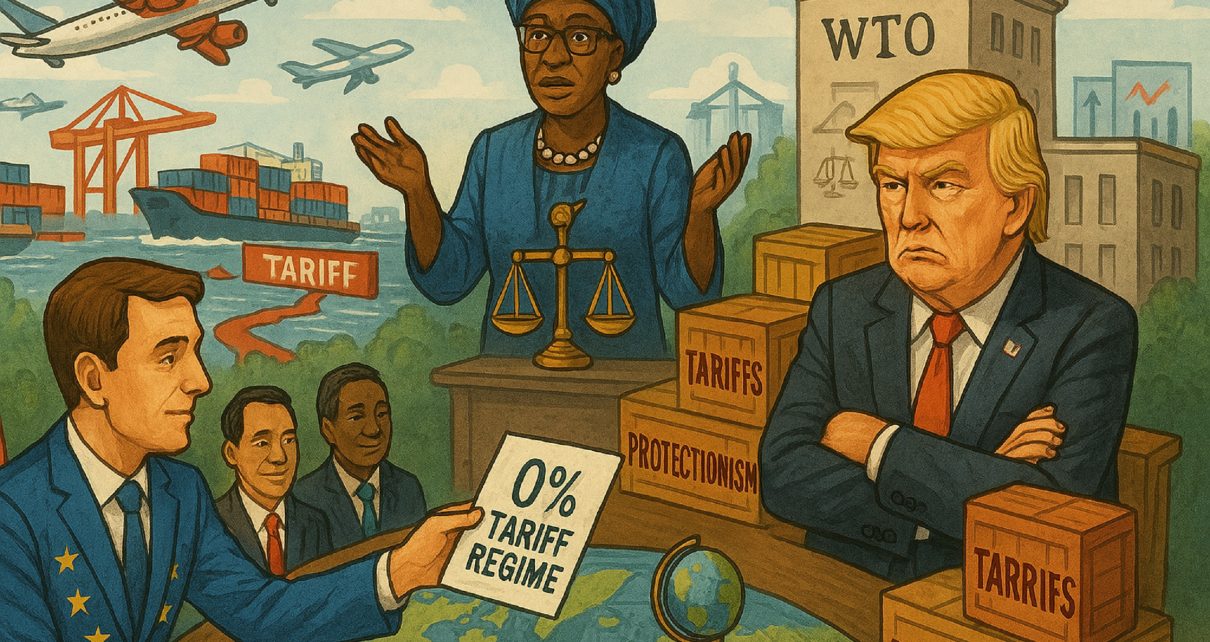In a bid to stabilise global trade amidst rising tensions fueled by U.S. President Donald Trump’s tariff policies, the European Union has taken an assertive stance, advocating for a 0% tariff regime. The EU, alongside nations like Vietnam, argues that eliminating tariffs on both sides could lead to a more balanced and frictionless trading system. This proposal has sparked interest among economic policymakers worldwide, prompting an examination of its potential consequences.
Proponents of the EU-led initiative contend that a tariff-free global economy would enhance efficiency and foster growth. By removing barriers, companies would experience lower costs, consumers would have access to more affordable goods, and developing economies could compete more fairly in international markets. Additionally, the elimination of trade disputes linked to tariffs could bring stability to volatile markets.
A world without tariffs could lead to increased trade flows and stronger diplomatic ties. Multinational businesses would benefit from predictable trading conditions, while governments could focus on non-tariff measures to regulate trade fairly. This approach could also encourage technological advancement and innovation, with fewer restrictions on cross-border exchanges.
Despite its allure, the transition to a 0% tariff regime presents significant hurdles. Governments rely on tariffs to support domestic industries and generate revenue. Removing tariffs may weaken local manufacturers, exposing them to stiff competition from low-cost imports. Additionally, wealthier nations with advanced industries might disproportionately benefit, leaving smaller economies vulnerable.
While the EU’s push for a tariff-free system offers an ambitious vision of economic integration, its success depends on nuanced negotiations and careful implementation. Policymakers must strike a balance between open markets and protective measures to ensure equitable benefits. As discussions unfold, the global community watches closely, assessing whether tariff elimination will create an inclusive trading environment or deepen economic disparities.
The World Trade Organization (WTO) generally supports trade liberalisation, but a 0% tariff regime presents both opportunities and challenges. The WTO’s tariff database provides insights into Most-Favoured-Nation (MFN) applied and bound tariffs, highlighting the complexities of tariff structures worldwide. While the WTO encourages preferential trade agreements, particularly for Least Developed Countries (LDCs), it also recognises the need for balanced trade policies that ensure fair competition.
A completely tariff-free system could simplify trade and enhance market access, but it might also raise concerns about revenue losses for governments and the potential for economic disparities between developed and developing nations. The WTO’s role in such discussions would likely focus on ensuring that any transition to a 0% tariff regime aligns with its principles of fair and equitable trade.
Amid recent trade tensions, WTO Director-General Dr. Ngozi Okonjo-Iweala has voiced concerns over the impact of U.S. tariff measures. Dr. Okonjo-Iweala also reaffirmed the WTO’s role as a mediator, emphasising that the organisation remains a platform for constructive dialogue amid rising trade tensions.
“Many members have reached out to us, and we are actively engaging with them in response to their questions about the potential impact on their economies and the global trading system.”
She cautioned that President Donald Trump’s newly announced tariffs could lead to a downturn in global trade, saying, “While the situation is rapidly evolving, our initial estimates suggest that these measures, alongside others introduced since the start of the year, could result in an overall contraction of approximately 1% in global merchandise trade volumes this year—a downward revision of nearly four percentage points from previous projections.”
Emphasising the risks of escalating trade conflicts, Dr. Okonjo-Iweala urged WTO member states to act prudently to avert a full-blown trade war and mitigate further economic instability. cautioning, “I am deeply concerned about this decline and the potential for escalation into a tariff war, with a cycle of retaliatory measures leading to further reductions in trade.”
Donald Trump cannot take the credit for the push for a tariff-free trade regime. Instead, his administration has focused on implementing reciprocal tariffs and protectionist policies, which have sparked global trade tensions. While some nations, like the EU and Vietnam, are advocating for a 0% tariff regime, this push seems to be a response to the economic disruptions caused by Trump’s tariffs rather than a direct result of his policies.
It’s an interesting dynamic—Trump’s actions have arguably catalysed discussions about alternative trade frameworks, but whether he claims or deserves credit for a tariff-free regime is a matter of perspective.
- An LM news analysis



